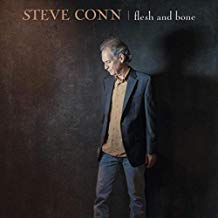Artist: Steve Conn
Album: Flesh and Bone
Label: Not Really
Release Date: 2.15.2019

Multi-instrumentalist Steve Conn is a long-term collaborator with Sonny Landreth and others from Louisiana. On this, his fifth album, he’s gathered an elite group of Louisiana-minded Nashville musicians from both places, including Landreth on two tracks, in this deeply soulful project produced by Joe V. McMahan (Kevin Gordon, Sarah Potenza, etc.). Joe V. recorded it at his studio in East Nashville. Conn and crew weave the sounds of New Orleans, the Swamp, and even strains of Bill Evans/Miles Davis as a backdrop to intriguing stories on this mortality-driven, stirring and, at times, beautiful recording.
For Conn, who has spent the bulk of his career as a sideman, he has a clear, expressive voice that adds poignancy to the characters he sings about. Conn chooses to use mostly warm sounding keyboards, from Hammond B3 to Fender Rhodes and his signature Wurlitzer, and plays alto sax as well. He is joined by drummer Bryan Owings (Tony Joe White, Emmylou Harris, Shelby Lynne), bassist Dave Francis (Maura O’Connell, Luke Combs), guitarist Joe V. McMahan, trombonist Roy Agee (Prince), and strings by Chris Carmichael (Miranda Lambert, Buddy Guy).
A veteran who has toured with Albert King, Conn played accordion with Levon Helm at the Ryman and contributed to ten Grammy-nominated albums, including Landreth’s recent Recorded Live in Lafayette, where he sings his own “The One and Only Truth.” Although Conn grew up in Louisiana, he’s spent time in Colorado and Los Angeles, but has resided in Nashville for the past two decades.
From the opening chorus of the leadoff track, “I’ll Be Famous When I’m Dead,” several of Conn’s songs indicate that he has mortality on his mind. “Sing Me to the Other Side,” and “Good Times Are Coming” all have that theme too. “Doing the Best I Can” is a strong melancholy breakup aftermath song. None are surprising given his take on songwriting. “I was born depressed. My entire life has been a response to that…A lot of the way I have learned to live with the demons by writing songs—but it’s not an escape, it’s part of the process.” This is not to suggest that it’s all gloomy. In fact, Conn has a dark sense of humor, and the ability to express himself elegantly too. He can surprise you.
The opening tune, with its NOLA second-line beat, is an example of his dark humor as he sings about the gap between fame and reality. The title track is a series of rhetorical, existential-like questions, with some sparkling piano, reminiscent somewhat of Bill Evans with Miles. He uses the lyrics for the illicit teenage love affair “’Sad-eyed Lady of The Lowlands’ played over and over again/ it was a midnight mass with the unholy Ghost/and the most unoriginal sin” in “Annalee.”
The upbeat NOLA rhythms belie the message of “Today was not a good day” in “Let Me Cry.” The lost love theme, begun in “Annalee,” is reprised beautifully in the gorgeous ballad, “Forever Seventeen,” a clear standout track. “Good Times are Coming” has his mother sending him away to Uncle Bill’s farm when she was too ill to care for her son, one of Conn’s best story songs, because he leaves us wondering whether his mother recovered or not. He also closes with a flourish. “Without a Trace” is a powerfully evocative literary song, with—you guessed it—tinges of mortality.
Conn brings outstanding musicianship and superb songwriting. This is a keeper.
—Jim Hynes







Be the first to comment!